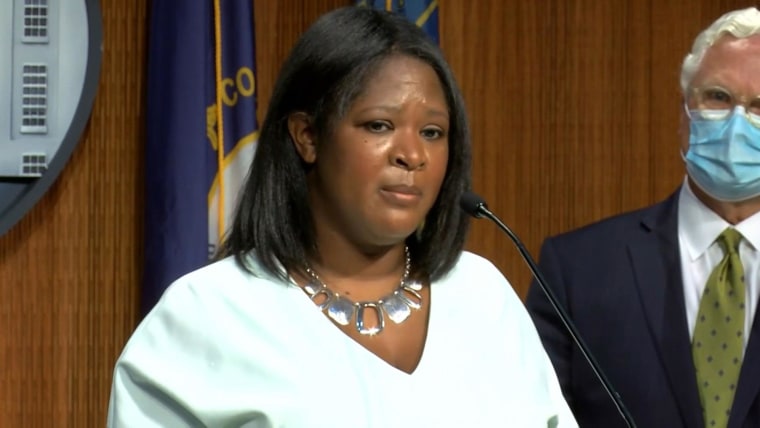LOUISVILLE, Ky. — The $12 million settlement Breonna Taylor’s family reached with the city of Louisville this week is being seen by many residents as a major victory for Taylor’s family, with supporters calling it “historic” and a “landmark” agreement.
Some local activists, however, are viewing it as only a first step toward obtaining justice for Taylor, and many remain on edge as a grand jury takes the next step and considers whether the police officers involved in her shooting death should be charged.
“This is one of the largest settlements in the country for the life of a black women — it’s monumental because it says that not only do Black lives matter, but Black women’s lives matter,” said Sadiqa Reynolds, president and CEO of the Louisville Urban League, adding that all eyes are now on Kentucky Attorney General Daniel Cameron, who NBC News has reported is preparing to present evidence to the grand jury as early as this week.
The settlement announced Tuesday includes police reforms like changes to the approval process for and the execution of search warrants; a housing credit program to provide incentives for officers to live in certain low-income areas in the city; and the expansion of random drug testing of officers.
LaRon Hobson, 32, who has led weekly worship sessions at Jefferson Square Park — the epicenter of the demonstrations in Louisville — praised the settlement, but he still doubled downed on the push for the officers to be held accountable in court.
“There’s no amount of money that will restore the life and legacy of Breonna Taylor,” Hobson said. “My hope is that the officers will be charged, that there will be real justice.”
Louisville Mayor Greg Fischer, in announcing the terms of the settlement, said Tuesday, “I cannot begin to imagine Ms. Palmer’s pain,” referring to Taylor’s mother, Tamika Palmer. “And I am deeply, deeply sorry for Breonna’s death.”
Officers killed Taylor, 26, an emergency medical technician, after midnight March 13 while serving a “no knock” warrant on her apartment as part of a drug investigation involving Taylor’s ex-boyfriend, Jamarcus Glover, a convicted drug dealer. He had listed her apartment as his address and used it to receive packages, authorities said. Taylor had no criminal record. No drugs were found in the apartment.
Residents said patience is faltering in Louisville where colorful signs bearing Taylor’s name are draped from lampposts and trees, and protesters continue to demand justice.
Cherrie Vaughn, 42, said that the handling of the case has exposed flawed institutional policies.
“We have to hold people accountable, and we have to rebuild trust and faith between the community and Louisville officials,” Vaughn said.
Keturah Herron, a policy strategist at the ACLU Kentucky who lobbied for Breonna’s law, which bans “no knock” warrants, applauded the police reforms contained in the settlement, but said that for Louisville to move forward a decision on the officers’ fate must be made soon.
“Whatever happens in the grand jury will set precedent for policing in the nation and the expectations that we have for our elected officials,” said Herron. “You see people in the community traumatized and hurt, and wanting answers.”
One of the police officers involved, Brett Hankison, who shot 10 rounds into Taylor’s apartment, was fired in June.
Two others, Officer Myles Cosgrove and Sgt. Jonathan Mattingly, have been placed on administrative leave, along with the detective who requested the warrant.
Ja’Mel Lewis, who attended several protests over the summer, said that residents stand behind Taylor’s family.
“Whatever Cameron comes out with we are going to support Tamika Palmer, and let her decide if justice has been served,” Lewis said.
Jennifer Strane, another Louisville resident, agreed and said that the city has waited long enough for a decision.
“We need answers now,” Strane said.
Janelle Griffith contributed.











